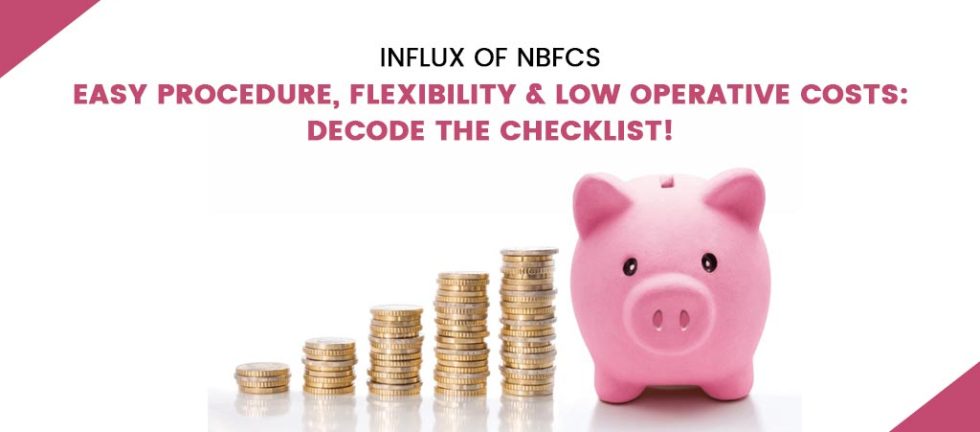Influx of NBFCs- Easy Procedure, Flexibility & Low Operative Costs: Decode the Checklist!
Venturing into Non-Banking Financial Companies (NBFCs) sector has become easier post demonetization. Realizing that the banks alone cannot cater to the financial demands of all Indians, the Reserve Bank of India (RBI) has simplified the norms for new entrants in this field.
NBFCs have created a niche for themselves as they have aggressively strategized to fill in the gap that exists between the banks and the public. They have diversified interests and are mainly engaged in loans and advances, acquisition of shares and stocks, insurance, leasing, hire-purchase, deposits, etc. Their customer-friendly approach combined with attractive rates of return and great flexibility has worked well in their expansion at a good pace.
The NBFCs are governed by the RBI, under the Reserve Bank of India Act, 1934, and time to time guidelines and directions issued by it.
If you are inclined towards exploring this space, then you should be aware of the factors that need to be fulfilled and followed for the Incorporation of an NBFC.
- The very first step should be registration of the said company under the Companies Act, 2013 or Companies Act, 1956, as a Private Limited Company or Limited Company.
- The company should have a minimum Net Owned Fund (NOF), which should be calculated as per RBI definition, of Rs. 200 lakhs. (Equity Share Capital, not Preference Share Capital)
- Open a bank account, keep a sum of at least Rs. 200 lakhs, free of any liens.
- At least one full-time director should be from a banking or NBFC background.
- The CIBIL record should be clean.
- Apply for Certificate of NBFC Registration online. The checklist of documents that needs to be submitted to the RBI is stated here-
- Certificate of Incorporation, issued by respective ROC.
- Certified copy of the MOA of the extract of main object clause explicitly depicting the financial business.
- Board resolution stating:
- The company is not carrying any NBFC activities and will not be indulging in any such activities before getting NBFC registration with RBI.
- It is adhering to the ‘Fair Practice code’ as laid down by the RBI guidelines.
- It is not in the business of accepting public funds; has never held such funds and does not intend to do so in the future too, without the approval of RBI.
- It has no public interface to date and will not begin one in the future unless approved by the RBI.
- Companies already in existence need to present an audited Balance Sheet along with a Profit & Loss Account for the entire period of its existence or last 3 years (whichever is less). In addition, directors’ and auditors’ reports also are submitted.
- Directors the highest educational and professional degree.
- Directors experience certificate specifying financial and banking exposure.
- Fixed deposit receipts along with banker’s certificate indicating balances supporting minimum NOF.
Read Also: Pros and Cons of NBFC Business in India
Once the application is duly filled and submitted, RBI will review it and may seek clarifications or additional documents, if needed. Once completely satisfied, RBI will grant a Certificate of Registration to the company to carry on as an NBFC.
This is a broad outline of requirements for NBFCs to be incorporated and registered but in actuality, there are more intricate details related to it, depending on the category of NBFC you want to register.
“The pundits of the financial world feel that this is the opportune moment to register for NBFCs as there is a lot of scope of capturing a market which is in its infancy.”
–Shweta Gupta, Founder, and CEO, MUDS


